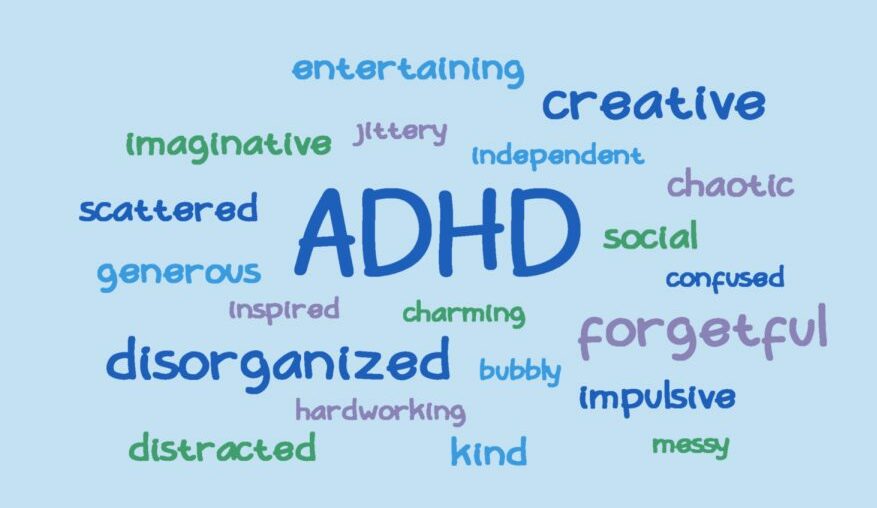Attention Deficit Hyperactivity Disorder (ADHD) is a mental disorder that can cause problems with focus, hyperactivity, and impulsiveness. The symptoms of ADHD can be disruptive and affect a person’s ability to complete tasks or socialize normally. If you think you or someone you know may have ADHD, it is important to get help from a healthcare professional. In this blog post, we will discuss the ADHD ICD-10 codes so that you can get the appropriate treatment.
Contents
What Is ADHD?
 ADHD refers to Attention Deficit Hyperactivity Disorder. It is a mental disorder that most often occurs in children. But this condition can also carry over into adulthood. People with ADHD may have problems paying attention, controlling impulsive behaviors (may act without thinking about what the result will be), or being overly active.
ADHD refers to Attention Deficit Hyperactivity Disorder. It is a mental disorder that most often occurs in children. But this condition can also carry over into adulthood. People with ADHD may have problems paying attention, controlling impulsive behaviors (may act without thinking about what the result will be), or being overly active.
ADHD can make it hard for people to finish tasks, follow instructions, and concentrate on schoolwork or conversations. It can also lead to disruptive behavior in classrooms and at work. Many people with ADHD also have problems with anxiety, depression, or substance abuse.
ADHD is not caused by bad parenting, too much sugar, or watching too much television. It is a real medical condition that affects the brain. Researchers are not sure what causes it, but they believe it may be due to a combination of genetic and environmental factors. So it is important to find an accurate diagnosis in order to get the best treatment.
What Is ICD-10?
ICD refers to the International Classification of Diseases, which is a system used to classify diseases and other health conditions. ICD-10 is the tenth revision of the ICD, and it was released in 1992. The ICD-10 manual is published by the World Health Organization (WHO).
ICD-codes are used to code diseases in order to facilitate data collection and analysis. It is believed that having a common coding system will help to improve the quality of health care data. ICD-codes are also used for reimbursement purposes.
Many people with ADHD will have one or more ICD-codeable comorbidities, such as anxiety, depression, and learning disabilities. In order to receive reimbursement for the treatment of ADHD, clinicians must use the appropriate ICD code(s). With a professional diagnosis and the correct ICD code(s), people with ADHD can get the treatment they need to improve their quality of life.
If you or someone you know has been diagnosed with ADHD, be sure to ask your clinician about which ICD-code(s) apply to your situation. Having this information can be helpful in getting the treatment and support you need.
What Are ADHD ICD-10 Codes?
 As ICD works through the codes for ADHD, it’s important to know what the coding system is. The ICD-code for ADHD is a five-digit code that stands for Attention Deficit Hyperactivity Disorder. According to the WHO, the codes are “used to classify diseases and other health conditions recorded on many types of health and vital records including death certificates and hospital records.”
As ICD works through the codes for ADHD, it’s important to know what the coding system is. The ICD-code for ADHD is a five-digit code that stands for Attention Deficit Hyperactivity Disorder. According to the WHO, the codes are “used to classify diseases and other health conditions recorded on many types of health and vital records including death certificates and hospital records.”
Let’s learn the ADHD ICD-10 codes! The codes are:
F90.0 – Predominantly Inattentive Type
F90.0 is the code for predominantly inattentive type ADHD. This means that a person with this type of ADHD will have symptoms of inattention, but not hyperactivity or impulsivity.
F90.0 is broken down into these categories:
Inattention:
- Easily distracted
- Forgetful
- Unable to complete tasks
Hyperactivity/Impulsivity:
- Not present or only present to a very mild degree (<18 months)
This is one of the three types of ADHD, and the one that is most commonly diagnosed in adults. Other codes in this category include:
- F41.0 – Generalized Anxiety Disorder
- F43.0 – Specific Phobia
- F44.0 – Panic Disorder
- F45.0 – Post-Traumatic Stress Disorder (PTSD)
So these are some ADHD ICD-10 codes that can be used to help with the diagnosis and treatment of ADHD. If you or someone you know has symptoms of ADHD, be sure to talk to a doctor about getting a proper diagnosis.
How Do ICD-10 Codes Help In ADHD?
It might seem like gibberish, but those five letters and numbers – F90.0, F90.81, F90.89 – are important when it comes to diagnosing attention deficit hyperactivity disorder (ADHD). They are the ICD-10 codes for ADHD, and they will be used by healthcare providers to ensure that patients with ADHD get the care and treatment they need.
Several things can happen when a patient with ADHD does not have the correct ICD code. They may be denied coverage for treatment, or they may only receive partial coverage. In some cases, patients may even be misdiagnosed because their symptoms do not match up with the code that was assigned to them.
While it might seem like a small thing, having the correct ICD-code can make a big difference in the lives of patients with ADHD. For example, it can help:
- Healthcare providers get a better understanding of the patient’s symptoms.
- Patients get the treatment they need.
- Researchers learn more about ADHD.
- Insurance companies provide adequate coverage for patients with ADHD.
If you or someone you know has been diagnosed with ADHD, be sure to ask your healthcare provider about which ICD-code was assigned. It could make all the difference in getting the care and treatment you need.
Who Can Diagnose ADHD From ICD-10?
 There are a few different types of healthcare professionals who can diagnose ADHD from ICD-10. The most common type is a pediatrician. Some other professionals who can make an ADHD diagnosis are:
There are a few different types of healthcare professionals who can diagnose ADHD from ICD-10. The most common type is a pediatrician. Some other professionals who can make an ADHD diagnosis are:
- Psychiatrists
- Psychologists
- Neurologists
- Family doctors
To make a diagnosis, these professionals will use ICD-10 criteria. The ICD-10 is the most recent version of the International Classification of Diseases. These professionals will also look at other factors, such as how well the patient is functioning at home, school, and work. They will also consider whether there is a family history of ADHD or other mental health disorders.
It is often believed that only children can have ADHD, but this is not the case. Adults can also suffer from ADHD, although it is often undiagnosed in adults. This is because the symptoms of ADHD often change as a person gets older. For example, an adult with ADHD may have problems with organization and time management, rather than hyperactivity.
How ADHD Is Diagnosed?
A diagnosis is based on a comprehensive evaluation. It includes:
- A medical history
- A physical exam
- Laboratory tests, such as a lead screening to rule out other possible causes of symptoms
- Information gathering from parents, teachers, or other adults who have observed the person’s behavior
In some cases, a psychological evaluation may also be done. A diagnosis of ADHD can be made if a child or adult has six or more symptoms of inattention, or six or more symptoms of hyperactivity and impulsivity, that have been present for at least six months to an extent that is disruptive to daily life.
The symptoms must appear before age seven. For a diagnosis in adults, some symptoms that were present in childhood must still be present. It is important to note that not all people with ADHD will have all the symptoms. So, overall a professional will look at the individual’s specific symptoms and how they affect daily functioning.
What Can You Do To Manage ADHD?
Sometimes, people with ADHD can be their own worst enemies. They may not mean to, but their impulsivity and inattention can lead to problems at work, school, or home. There are a few things you can do to manage your ADHD:
Talk to your doctor
This is the first step in managing your ADHD. Your doctor can help you understand your diagnosis and figure out the best course of treatment. Also, professional help can provide you with the tools and resources you need to better manage your ADHD. They can provide you with tips on how to better organize your life, set goals, and stay on task.
If you’re struggling to manage your ADHD, talk to someone who can help. This could be a therapist, psychiatrist, or other mental health professional. In addition, talking to your family members or close friends about your ADHD can be helpful. There are also many support groups for people with ADHD. These groups can provide you with information and resources, and they can be a great way to connect with others who understand what you’re going through.
Get organized
One of the best things you can do to manage your ADHD is to get organized. Having a plan and a schedule can help you stay on track and avoid getting overwhelmed. Use a planner or calendar to keep track of important dates and deadlines. Create to-do lists to help you remember what needs to be done. And, try to stick to a routine as much as possible.
Take breaks
When you’re feeling overwhelmed or stressed, take a break. Go for a walk, listen to music, or read a book. Taking a few minutes to yourself can help you regroup and refocus. Because when you’re feeling calm and relaxed, it’s easier to manage your ADHD. For example, if you’re feeling overwhelmed at work, take a few minutes to yourself in the bathroom or step outside for some fresh air.
Exercise
 Exercise is a great way to manage ADHD. It can help improve your focus, concentration, and energy levels. Plus, it’s a great way to relieve stress. So, try to get some exercise every day. There are a few different types of exercise that can be especially helpful for people with ADHD. These include:
Exercise is a great way to manage ADHD. It can help improve your focus, concentration, and energy levels. Plus, it’s a great way to relieve stress. So, try to get some exercise every day. There are a few different types of exercise that can be especially helpful for people with ADHD. These include:
- Aerobic exercise: This type of exercise gets your heart pumping and can help to improve your mood and energy levels. It can also help to improve your sleep quality.
- Anaerobic exercise: This type of exercise is more high-intensity and can help to improve your focus and concentration.
- Mindfulness: This type of exercise helps you to focus on the present moment and can be very calming. It can also help to improve your sleep quality.
So these are some of the basic tips that can help you in managing your ADHD. Moreover, it is important to keep in mind that everyone is different, and what works for one person may not work for another. If you’re struggling to manage your ADHD, don’t hesitate to reach out for help.
Conclusion
To conclude, ADHD ICD-10 codes F90.0, F90.81, and F90.89 are the three most common codes used to diagnose this disorder. This means that if you or someone you know has been diagnosed with ADHD, chances are one of these codes was used. If you have any questions about these codes or what they mean, be sure to ask a mental health professional.
However, it’s important to remember that these codes are only a small part of the bigger picture when it comes to ADHD. This disorder is complex and unique, and its symptoms can vary widely from person to person.
For more tips and guidance, you can reach out to Therapy Mantra. The team of professional counselors is more than happy to help you in your journey to recovery. Contact us today to learn more about our services. You can also book an online therapy session or download our free Android or iOS app.


